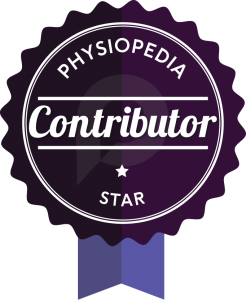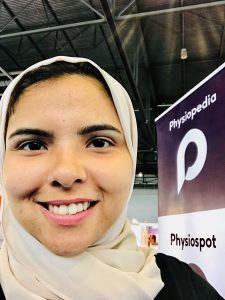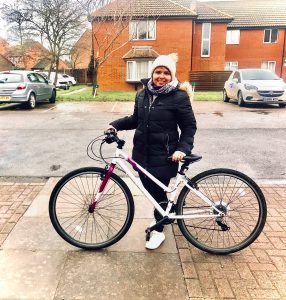It is that time again, to show our appreciation to a dedicated Physiopedia  volunteer. For the month of February, the Physiopedia Team is proud to announce that Mariam has been chosen for our monthly award.
volunteer. For the month of February, the Physiopedia Team is proud to announce that Mariam has been chosen for our monthly award.
Mariam has been volunteering for Physiopedia since 2018 and has been involved in numerous projects, pages and courses. You can bet that Mariam’s work has crossed your path at some point while using Physiopedia resources.
Her smile, reliability and purposefulness is contagious and has benefited all whom have had the priviledge or working with her.
Well deserved Mariam, Bravo on your award!
Your Name: Mariam Hashem Mohana
Time active with Physiopedia: Since June 2018, I started with a small editing project with Wendy Walker then joined the volunteer orientation course in November 2018. In June 2019, I started working as a Learning Architect.
Current role with Physiopedia: I am a Learning Architect, developing courses for Physioplus.This involves creating pages, writing courses info and quizzes. I also help facilitating the volunteer orientation courses.
Where did you go to school? I studied in Cairo for six years, then I moved with my family to Saudi Arabia. This is where I lived for few years before moving back to Cairo to study physiotherapy at Cairo University. I was qualified as a PT from Cairo University in 2012 and then did my internship in the Cairo University hospitals.
Where do you work? After becoming qualified, I moved between different places; from trauma & orthopaedics, neurology and paediatrics until finally getting specialized in musculoskeletal (MSK) practice in 2015, working in a public community hospital as well as private practice. Last year, March 2019, I moved to the UK, where I worked for different clinical sites in three beautiful sea-side towns in the south-east coast: Deal, Folkestone and Dover.
Describe your role (clinical / field work / research / academia etc.): I am a senior physiotherapist, managing a caseload of MSK patients. I see a variety of conditions such as osteoarthritis, chronic pain and post-operative arthroplasty procedures and repairs. I also deliver two exercise groups; one to help people with reduced mobility and another specialized group for shoulder conditions.
What is the most rewarding part of being a PT? Making a difference in someone’s life. It’s an amazing feeling and you only get it when actively listening to the patients and empower them to take control of their own treatment.
I also enjoy learning and reflecting on my practice. I sit down and think about the things I’ve learnt from my patients and things that I can do differently. It makes my practice meaningful and fruitful.
What are some of the more challenging aspects about being a PT? Physios now are being challenged, as there is a need to know more and develop breadth as well as depth to knowledge and become curious to find answers to complicated clinical matters. Individualizing treatment when you only have limited time and implementing treatment guidelines of long-term conditions in limited resource settings can also be challenging.
What are some of your professional passions? Developing knowledge in chronic pain and cognitive behavioural therapy is an area of particular interest to me. I’m also passionate about current thinking in shoulder conditions and physiotherapy management.
What are a few of your personal passions? I’m very curious to learn new things, especially about people and cultures. Since moving to the UK, I’ve become very intrigued to learn about culture and history. Chess sits on top of my list of hobbies. I also like yoga and cycling.
What would be your advice to a newly graduating Physiotherapist?
Enjoy the ride and never stop learning. Be open to different ways of thinking. It can be stressful when you start your career so don’t hesitate to reach out for support when you need it, nothing is worse than feeling alone.
Where do you see yourself in 5 years? This is an interesting question! I’m very well planned but I always end up in a different direction and another path that is usually ways better than what I’ve decided on in the first place. But looking five years ahead from now, I want to consider a career in teaching and research and I also want to go backpacking for some time!
What are the best things about being a Physiopedia (PP) volunteer? The team! Networking has been the most rewarding part of being with Physiopedia. I’ve met physiotherapists from around the world and have been learning and sharing thoughts and ideas with them.
Going to the WCPT 2019 with PP was an amazing experience and has been a game changer that helped me discover new areas of interest and opened my eyes on new possibilities and opportunities.
How has being a Physiopedia volunteer helped your professional development /career progression? I do quite a lot of searching in the literature, reading and summarizing while working on courses. This has been a great way of improving my knowledge and clinical skills. Activities such as meetings and collaborations have improved my communication and team working skills.
What are your hopes and aspirations for Physiopedia? Continue to grow larger and wider, reaching more physiotherapists, universities and patients and possibly giving free access to research and articles.
What is your favourite Physioplus course? The ACL programme. Very informative and has changed my way of clinical management not just for ACL conditions but generally through learning how to plan my treatment.
Anything else you would like to share? I have learnt a lot in the past two years with Physiopedia and this wouldn’t have happened without the wonderful team so I would like to give many thanks: Rachael, Tony, Tarina, Kim and Amanda for their support and for being part of this amazing journey.
Thank you for sharing your thoughts Mariam. Physiopedia is fortunate to have your mind, passion and work ethic on the team. Congratulations on your award this month! – The Physiopedia Team.
